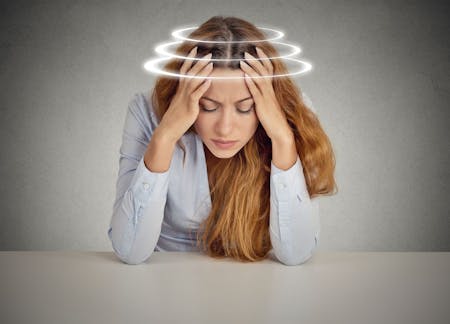
Dizziness (vertigo) is the sensation spinning or turning even when you're not. The word come from the Latin word "verter", which means "to turn", and the English word "whirling". This feeling may be anything from barely noticeable to severe enough to make it difficult to maintain your balance and do everyday tasks. The feeling may also be accompanied by:
- Nausea
- Dizziness and/or lightheadness
Positional vertigo is a spinning sensation occurring after a person repositions their head. A spinning sensation is often caused by inner ear problems.
Disequilibrium is the sensation of an impending fall or the need for external assistance to maneuver from here to there. Some people describe a floating sensation or that the floor or room appears tilted.
What causes vertigo?
Doctors often categorize vertigo causes into two groups, according to whether the site of the problem is in the central nervous (brain) or the vestibular (peripheral) system. Thus, vertigo may be caused by certain parts of your brain (cerebral cortex, cerebellum, brainstem):
- Cerebrovascular Disease
- Migraine
- Multiple Sclerosis (MS)
- Acoustic Neuroma
- Central nervous system disorders such as migraine-associated dizziness, the sequelae of trauma, ischemic disease (including vertebrobasilar insufficiency and brain-stem stroke), and degenerative neurologic disorders that affect the cerebellum
Or vestibular system (vestibular labyrinth, semicircular canals or vestibular nerve):
- Benign paroxysmal positional vertigo (BPPV) - where certain head movements trigger vertigo
- An inner ear infection (labyrinthitis)
- Inflammation of the vestibular nerve (vestibular neuronitis)
Sometimes, it may even be caused by a fever, ringing in your ears (tinnitus) or even hearing loss.
Vertigo usually occurs when tiny particles, called otoconia, in the utricle (part of your inner ear) break loose and fall into the semicircular canals (other parts of your inner ear). The most common treatment for this problem is called the Epley Maneuver, a maneuver used to treat benign paroxysmal positional vertigo (BPPV) of the posterior or anterior canals.
It works by relocating the free-floating otolith crystals from the affected semicircular canal(s) back into the utricle, using gravity. This provides relief for many BPPV sufferers because the particles are no longer stimulating the cupula - the part of your vestibular system that provides the sense of spatial orientation. A few people may need subsequent treatments. Talk to your physical therapist if your symptoms don't improve.
Balance Problems
Balance problems and vertigo often go hand-in-hand because many people with balance problems also have vertigo. Age is one of the most common causes of balance problems. Balance problems are among the most common reasons that older adults go to their doctors. Another common cause of vertigo is disturbances of the inner ear (also known as the labyrinth). These disturbances are often caused by labyrinthitis, a condition where the labyrinth becomes infected or swollen. Upper respiratory infections, other viral infections, and, less commonly, bacterial infections can also lead to labyrinthitis.
Other causes of balance problems can include:
- Diseases of the circulatory system, such as stroke, also known as a Cerebrovascular Accident (CVA)
- High blood pressure (HBP) or Low Blood Pressure (LBP)
- A head injury
- Diabetes - multi-sensory vertigo, disequilibrium or dizziness can be caused by a combination of peripheral neuropathy, visual impairment, changes in joint mobility, and hearing or inner ear impairments
- Other Illnesses - ear infection, stroke, or multiple sclerosis can also cause balance problems
Contact us today if you are experiencing dizziness or balance problems.
